|
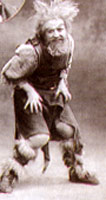 In his cavern workshop near Fafner's lair, Mime complains bitterly as he toils at an anvil to forge a new sword for Siegfried, who has grown to manhood. The impotent, hate-filled Nibelung has fashioned many blades for his ward, but they always broke into pieces when tested. Though Mime secretly has kept the shattered Nothung, the magic sword wielded by Siegfried's father, he lacks the skill to restore its fragments. If he could do so, with Siegfried's help, he would fulfill his dream of obtaining Fafner's Ring and becoming ruler of the world. A hunting horn announces the approach of Siegfried, who bounds in with a bear he has captured, playfully scaring Mime before releasing the animal to the forest. Impatient for a new sword, Siegfried grasps Mime's latest effort, only to have the weapon snap like a toy in his hands. To avoid the headstrong youth's anger, the Nibelung offers kind words and food, both brusquely rebuffed. At this, Mime whiningly reminds Siegfried of the long years he has looked after him and all he has taught him. Siegfried retorts he has never learned to tolerate the sight of Mime, nor does he know why he continues to live with him. They do not resemble each other, he says, and grabbing Mime by the throat, he demands to know who his real parents were. The Nibelung confesses that years ago he found a woman in distress in the woods and nursed her as she died giving birth. Her name was Sieglinde, and the baby's father had fallen in combat; Siegfried's name is a legacy from his mother. Moved by the story, Siegfried asks for proof of what he has been told, at which Mime takes forth the splintered remnants of the sword Nothung. At once the youth insists the weapon be welded whole, so he can go forth into the world to seek adventure. Siegfried runs back into the forest.
In his cavern workshop near Fafner's lair, Mime complains bitterly as he toils at an anvil to forge a new sword for Siegfried, who has grown to manhood. The impotent, hate-filled Nibelung has fashioned many blades for his ward, but they always broke into pieces when tested. Though Mime secretly has kept the shattered Nothung, the magic sword wielded by Siegfried's father, he lacks the skill to restore its fragments. If he could do so, with Siegfried's help, he would fulfill his dream of obtaining Fafner's Ring and becoming ruler of the world. A hunting horn announces the approach of Siegfried, who bounds in with a bear he has captured, playfully scaring Mime before releasing the animal to the forest. Impatient for a new sword, Siegfried grasps Mime's latest effort, only to have the weapon snap like a toy in his hands. To avoid the headstrong youth's anger, the Nibelung offers kind words and food, both brusquely rebuffed. At this, Mime whiningly reminds Siegfried of the long years he has looked after him and all he has taught him. Siegfried retorts he has never learned to tolerate the sight of Mime, nor does he know why he continues to live with him. They do not resemble each other, he says, and grabbing Mime by the throat, he demands to know who his real parents were. The Nibelung confesses that years ago he found a woman in distress in the woods and nursed her as she died giving birth. Her name was Sieglinde, and the baby's father had fallen in combat; Siegfried's name is a legacy from his mother. Moved by the story, Siegfried asks for proof of what he has been told, at which Mime takes forth the splintered remnants of the sword Nothung. At once the youth insists the weapon be welded whole, so he can go forth into the world to seek adventure. Siegfried runs back into the forest.
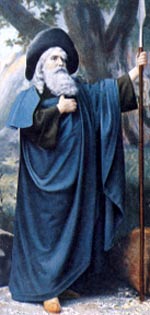 As Mime sits dejected, an aged Wanderer (Wotan) appears. Soon the unwanted guest proposes a battle of wits in which he will forfeit his head should he lose. Mime, though suspicious, agrees, then proceeds to ask the Wanderer three questions: what race lives under the earth (the Nibelungs), on the face of the earth (the giants) and on the cloudy heights (the gods)? The Wanderer answers correctly, then declares that Mime too must answer three questions, to save his own head: what is the race Wotan mistreats but loves most (the Walsungs), what is the sword Siegfried must use if he is to kill the dragon Fafner (Nothung), and who will repair the weapon? When Mime cannot answer the last question, the Wanderer tells him the sword can be forged only by one who has never known fear - and he leaves the gnome's head as bounty to that person.
As Mime sits dejected, an aged Wanderer (Wotan) appears. Soon the unwanted guest proposes a battle of wits in which he will forfeit his head should he lose. Mime, though suspicious, agrees, then proceeds to ask the Wanderer three questions: what race lives under the earth (the Nibelungs), on the face of the earth (the giants) and on the cloudy heights (the gods)? The Wanderer answers correctly, then declares that Mime too must answer three questions, to save his own head: what is the race Wotan mistreats but loves most (the Walsungs), what is the sword Siegfried must use if he is to kill the dragon Fafner (Nothung), and who will repair the weapon? When Mime cannot answer the last question, the Wanderer tells him the sword can be forged only by one who has never known fear - and he leaves the gnome's head as bounty to that person.
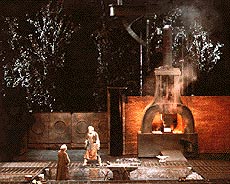 Hearing distant growls, Mime panics, thinking Fafner is coming, but it is only Siegfried, eager to wield his father's sword. Mime tries to find out whether the youth comprehends the meaning of fear. Since he does not, Mime decides to take him to Fafner's lair, where surely he will learn. When Siegfried once more orders Mime to finish Nothung, the Nibelung sobs that he lacks the craft, at which Siegfried repairs the sword himself, launching into a spirited forging song as he works. While the youth toils, Mime plots to get rid of him once the dragon has been killed and the treasure recovered. Siegfried brandishes the finished sword, splits the anvil with it and rushes into the forest.
Hearing distant growls, Mime panics, thinking Fafner is coming, but it is only Siegfried, eager to wield his father's sword. Mime tries to find out whether the youth comprehends the meaning of fear. Since he does not, Mime decides to take him to Fafner's lair, where surely he will learn. When Siegfried once more orders Mime to finish Nothung, the Nibelung sobs that he lacks the craft, at which Siegfried repairs the sword himself, launching into a spirited forging song as he works. While the youth toils, Mime plots to get rid of him once the dragon has been killed and the treasure recovered. Siegfried brandishes the finished sword, splits the anvil with it and rushes into the forest.
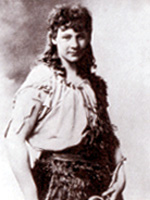 That night, Alberich keeps vigil near Fafner's cave, brooding over his lost treasure, determined to regain the Ring. When the Wanderer approaches, bathed in eerie light, the Nibelung at once recognizes him as Wotan. The god assures him that he no longer cares about the Ring - he is now only an observer of destiny. He adds that it is Mime whom Alberich should fear, for Mime wants the gold and brings a valiant young hero to slay Fafner. The Nibelung is perplexed that his enemy seems to be helping him. Wotan and Alberich rouse the sleeping Fafner to warn him of approaching danger, urging him to surrender the Ring, but Fafner only mumbles he will devour any attacker. God and Nibelung disappear in the shadows.
That night, Alberich keeps vigil near Fafner's cave, brooding over his lost treasure, determined to regain the Ring. When the Wanderer approaches, bathed in eerie light, the Nibelung at once recognizes him as Wotan. The god assures him that he no longer cares about the Ring - he is now only an observer of destiny. He adds that it is Mime whom Alberich should fear, for Mime wants the gold and brings a valiant young hero to slay Fafner. The Nibelung is perplexed that his enemy seems to be helping him. Wotan and Alberich rouse the sleeping Fafner to warn him of approaching danger, urging him to surrender the Ring, but Fafner only mumbles he will devour any attacker. God and Nibelung disappear in the shadows.
As dawn breaks, sunlight penetrates the dense foliage of the forest. Mime enters with Siegfried, showing him Fafner's lair. Dismissed by the youth, the treacherous gnome hobbles off. Siegfried stretches on the ground under a lime tree to rest, enchanted by the murmur of the forest, yearning for the mother he never knew. High in the branches over his head, a Forest Bird warbles a song he wishes he could understand. Cutting a reed and blowing on it, Siegfried tries to imitate the bird.
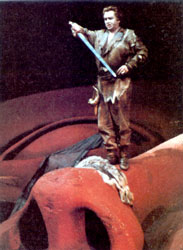 Then he raises his silver hunting horn to his lips, inadvertently awakening Fafner, who rumbles forth from his den. During the ensuing struggle, Siegfried plunges his sword into the monster's heart. Dying, Fafner warns that whoever put Siegfried up to this deed is plotting his death as well. When Siegfried draws Nothung from the beast, his fingers are burned by blood, so he touches them to his lips. The taste of the dragon's blood enables him to understand the language of the Forest Bird, who tells him of the Nibelung hoard, the Tarnhelm and all-powerful Ring. As Siegfried disappears into the cave to inspect the treasure, Mime slinks back, only to be confronted by Alberich. The brothers quarrel over the spoils, withdrawing when Siegfried reappears, carrying proof of his victory - the Tarnhelm, which he fastens to his belt, and the Ring, which he places on his hand. Now the Forest Bird warns Siegfried about Mime, who soon creeps forward, bearing a poisoned drink. Reading the dwarf's true thoughts, the youth loses patience with the Nibelung and kills him, as Alberich's laughter echoes in the distance. While Siegfried rests, lamenting his solitude, the bird tells of a maiden who sleeps on a fire-encircled rock - Brünnhilde, a bride who can be won only by a hero who knows no fear. The youth runs through the forest toward the mountain where she sleeps.
Then he raises his silver hunting horn to his lips, inadvertently awakening Fafner, who rumbles forth from his den. During the ensuing struggle, Siegfried plunges his sword into the monster's heart. Dying, Fafner warns that whoever put Siegfried up to this deed is plotting his death as well. When Siegfried draws Nothung from the beast, his fingers are burned by blood, so he touches them to his lips. The taste of the dragon's blood enables him to understand the language of the Forest Bird, who tells him of the Nibelung hoard, the Tarnhelm and all-powerful Ring. As Siegfried disappears into the cave to inspect the treasure, Mime slinks back, only to be confronted by Alberich. The brothers quarrel over the spoils, withdrawing when Siegfried reappears, carrying proof of his victory - the Tarnhelm, which he fastens to his belt, and the Ring, which he places on his hand. Now the Forest Bird warns Siegfried about Mime, who soon creeps forward, bearing a poisoned drink. Reading the dwarf's true thoughts, the youth loses patience with the Nibelung and kills him, as Alberich's laughter echoes in the distance. While Siegfried rests, lamenting his solitude, the bird tells of a maiden who sleeps on a fire-encircled rock - Brünnhilde, a bride who can be won only by a hero who knows no fear. The youth runs through the forest toward the mountain where she sleeps.
By night, as thunder and lightning threaten a wild mountain gorge, the Wanderer summons Erda from sleep. Concealing his identity, he seeks knowledge of the future. Erda evades the questions, and the god, resigning himself to Valhalla's doom, bequeaths the world to the redemptive power of Brünnhilde's love. When Siegfried ventures into the gorge, the Wanderer encounters his grandson, inquiring with humor about his exploits and the sword he wears. Siegfried responds arrogantly, angering the god, who tries to block his path. Drawing Nothung, the youth splinters the Wanderer's spear with a single stroke. Realizing his power has ended, the deity retrieves the broken pieces, then vanishes as Siegfried scales the mountain.
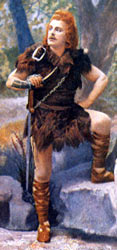 Dawn breaks on the rocky height where Brünnhilde rests. Reaching the summit, Siegfried discovers an armed, sleeping figure, which he assumes to be a man. When he removes the Valkyrie's shield, helmet and breastplate, however, he finds instead the first woman he has ever seen. At last sensing fear, he invokes the spirit of his mother, finally summoning the courage to kiss the maiden's lips. Brünnhilde, roused from her long slumber, slowly realizes she is not dreaming, that Siegfried has come. She hails the sunlight and her return to life. When Siegfried tries to embrace her, she starts in alarm, protesting that earthly passion would destroy her immortality. But she is mortal, no longer a Valkyrie, and womanly ardor soon replaces shame and fear. Throwing herself into Siegfried's arms, she bids farewell to memories of Valhalla, abandoning herself to human love, exulting even in thoughts of death.
Dawn breaks on the rocky height where Brünnhilde rests. Reaching the summit, Siegfried discovers an armed, sleeping figure, which he assumes to be a man. When he removes the Valkyrie's shield, helmet and breastplate, however, he finds instead the first woman he has ever seen. At last sensing fear, he invokes the spirit of his mother, finally summoning the courage to kiss the maiden's lips. Brünnhilde, roused from her long slumber, slowly realizes she is not dreaming, that Siegfried has come. She hails the sunlight and her return to life. When Siegfried tries to embrace her, she starts in alarm, protesting that earthly passion would destroy her immortality. But she is mortal, no longer a Valkyrie, and womanly ardor soon replaces shame and fear. Throwing herself into Siegfried's arms, she bids farewell to memories of Valhalla, abandoning herself to human love, exulting even in thoughts of death.
SIEGFRIED
Act Three Scene Three
SIEGFRIED:
gedehnt mit gepreßtem, drängendem Ausdruck
So saug' ich mir Leben
aus süßesten Lippen,
sollt' ich auch sterbend vergehn!
Er sinkt, wie ersterbend, auf die Schlafende und heftet mit
geschlossenen Augen seine Lippen auf ihren Mund. Brünnhilde schlägt die Augen
auf.
Siegfried fährt auf und bleibt vor ihr stehen.
Brünnhilde richtet sich langsam zum Sitze auf.
Sie begrüßt mit feierlichen Gebärden der erhobenen Arme ihre Rückkehr zur Wahrnehmung der Erde und des Himmels
BRÜNNHILDE:
Heil dir, Sonne!
Heil dir, Licht!
Heil dir, leuchtender Tag!
Lang war mein Schlaf;
ich bin erwacht.
Wer ist der Held, der mich erweckt'?
SIEGFRIED:
von ihrem Blicke und ihrer Stimme feierlich ergriffen, steht wie festgebannt
Durch das Feuer drang ich,
das den Fels umbrann;
ich erbrach dir den festen Helm:
Siegfried bin ich, der dich erweckt'.
BRÜNNHILDE:
hoch aufgerichtet sitzend
Heil euch, Götter!
Heil dir, Welt!
Heil dir, prangende Erde!
Zu End' ist nun mein Schlaf;
erwacht, seh' ich:
Siegfried ist es, der mich erweckt!
SIEGFRIED:
in erhabenste Verzückung ausbrechend
O Heil der Mutter, die mich gebar;
Heil der Erde, die mich genährt!
Daß ich das Aug' erschaut,
das jetzt mir Seligem lacht!
BRÜNNHILDE
mit größter Bewegtheit
O Heil der Mutter, die dich gebar!
Heil der Erde, die dich genährt!
Nur dein Blick durfte mich schau'n,
erwachen durft' ich nur dir!
Beide bleiben voll strahlenden Entzückens in ihren gegenseitigen Anblick verloren
O Siegfried! Siegfried! Seliger Held!
Du Wecker des Lebens, siegendes Licht!
O wüßtest du, Lust der Welt,
wie ich dich je geliebt!
Du warst mein Sinnen,
mein Sorgen du!
Dich Zarten nährt' ich,
noch eh' du gezeugt;
noch eh' du geboren,
barg dich mein Schild:
so lang' lieb' ich dich, Siegfried!
SIEGFRIED:
leise und schüchtern
So starb nicht meine Mutter?
Schlief die minnige nur?
BRÜNNHILDE:
lächelnd, freundlich die Hand nach ihm ausstreckend
Du wonniges Kind!
Deine Mutter kehrt dir nicht wieder.
Du selbst bin ich,
wenn du mich Selige liebst.
Was du nicht weißt,
weiß ich für dich;
doch wissend bin ich
nur - weil ich dich liebe!
O Siegfried! Siegfried! Siegendes Licht!
Dich liebt' ich immer;
denn mir allein erdünkte Wotans Gedanke.
Der Gedanke, den ich nie nennen durfte;
den ich nicht dachte, sondern nur fühlte;
für den ich focht, kämpfte und stritt;
für den ich trotzte dem, der ihn dachte;
für den ich büßte, Strafe mich band,
weil ich nicht ihn dachte und nur empfand!
Denn der Gedanke - dürftest du's lösen! -
mir war er nur Liebe zu dir!
SIEGFRIED:
Wie Wunder tönt, was wonnig du singst;
doch dunkel dünkt mich der Sinn.
Deines Auges Leuchten seh' ich licht;
deines Atems Wehen fühl' ich warm;
deiner Stimme Singen hör' ich süß:
doch was du singend mir sagst,
staunend versteh' ich's nicht.
Nicht kann ich das Ferne sinnig erfassen,
wenn alle Sinne dich nur sehen und fühlen!
Mit banger Furcht fesselst du mich:
du Einz'ge hast ihre Angst mich gelehrt.
Den du gebunden in mächtigen Banden,
birg meinen Mut mir nicht mehr!
Er verweilt in großer Aufregung, sehnsuchtsvollen Blick auf sie heftend
|












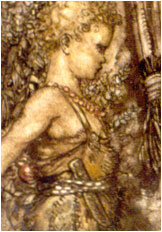
 Download full version of Ring movie
Download full version of Ring movie









